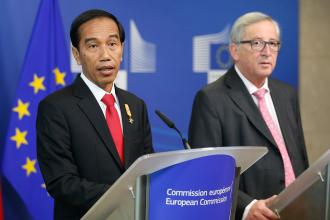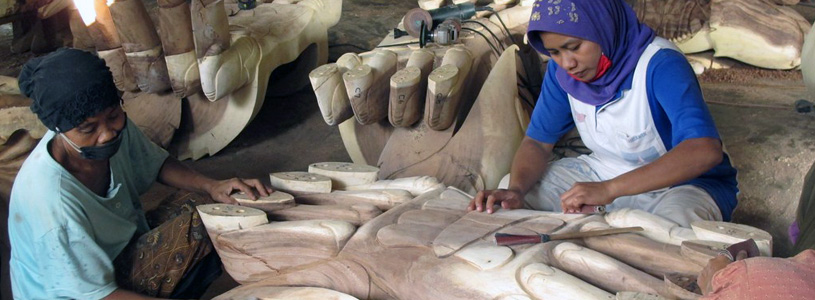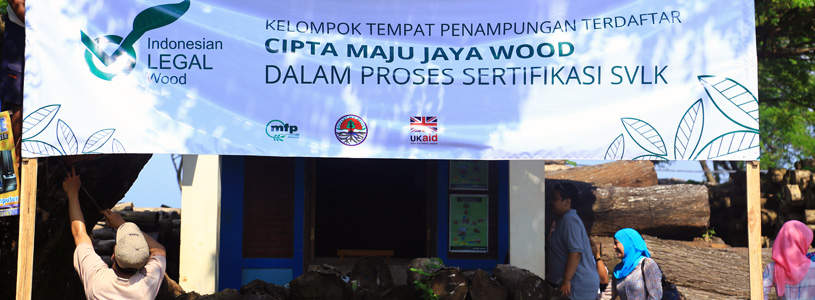
This article originally appeared on the FLEGT.org website.
The Presidents of Indonesia, the European Commission and the European Council today confirmed that Indonesia has met the final major requirement of its Voluntary Partnership Agreement (VPA) with the EU and is on course to become the world’s first country to issue FLEGT licences.
This milestone in the FLEGT-VPA experiment is the strongest sign yet that, by harnessing the power of the EU market, it is possible to improve forest governance and assure buyers that timber products comply fully with laws in their countries of origin.
Indonesia is not alone in partnering with the EU to address illegal logging. Fourteen other countries are negotiating or implementing VPAs with the EU. Together these countries supply 80% of the tropical timber imported to the EU. Among these countries, Ghana is also at an advanced stage of implementing a timber legality assurance system ahead of FLEGT licensing.
Today’s announcement is set to energise global efforts to stop illegal logging. It has come about through the fusion of Indonesian leadership, UK aid and EU market power, unleashed through the EU FLEGT Action Plan and associated legislation.
In 2001, Indonesia hosted a conference that put illegal logging on the global agenda. The meeting showed that illegal logging was not just a problem for producer countries: consumer countries were also part of the problem. The UK agreed and, in 2002, signed a bilateral agreement and action plan with Indonesia to address illegal logging.
Indonesian policymakers and timber industries were clear, however, that the UK market alone did not offer a sufficient incentive to shift behaviour dramatically. The UK therefore joined with the rest of the EU to develop the EU Forest Law Enforcement, Governance and Trade (FLEGT) Action Plan of 2003, and strengthen the market incentive to stop illegal logging.
Through FLEGT, the EU introduced legislation that prohibits anyone from placing illegal timber on the EU market, the EU Timber Regulation. The EU also empowered the European Commission to negotiate Voluntary Partnership Agreements with timber-producing countries such as Indonesia to promote trade in legal timber products.
The UK has provided £40 million over 15 years for technical support and capacity building to make VPA negotiations possible. This support has ensured broad stakeholder participation in decision making and has enabled Indonesia to design, develop and implement a timber legality assurance system and roll it out nationwide.
With UK support, Indonesia has trained nearly 15,000 local government supervisors, sustainable forest management technicians, staff at regional forest management offices and village heads. Indonesia has used its timber legality assurance system to audit the legality of more than 20 million hectares of forests and more than 1700 forest industries, an unprecedented level of scrutiny.

To ensure that small businesses such as furniture makers are not left out, in 2015, Indonesia allocated 7 billion rupiah to help more than 1,200 small and medium enterprises become certified legal under the timber legality assurance system. To date, 93% of Indonesia’s small or medium sized furniture exporters have been certified legal. This means they can export their products to an increasingly discerning international market.
Today’s announcement attests that Indonesia, with support from the EU and the UK, has overhauled a forest sector once renowned for conflict, corruption and criminality. In 2002, just 20% of Indonesian timber was considered to be legal. Today, over 90% of Indonesian timber exports come from independently audited factories and forests; and the remainder will be audited in the coming months.
Civil society groups play an important role as independent monitors, feeding information into the new mechanisms in place for reporting and addressing forest crimes. Sales of furniture to the EU are growing. Illegal loggers have been squeezed out and the government is collecting the taxes and revenues it previously lost.
FLEGT-licensed products automatically meet the requirements of the EU Timber Regulation, which prohibits EU operators from placing illegally harvested timber and timber products on the EU market. With mandatory checks of the timber legality assurance system that meet international market requirements in place, the Government of Indonesia expects furniture exports to increase, delivering more rural jobs, income and growth.
The EU can now proceed to complete the necessary procedures to make Indonesia’s FLEGT licensing scheme fully operational. When these procedures are complete, the Indonesia-EU Joint Implementation Committee can recommend a date for FLEGT licensing to start. With fourteen more countries engaged in VPA processes, all eyes will be on Indonesia in the coming months.

Read more
News and press releases
- Press release by the European Commission: EU and Indonesia to start first-ever licensing scheme for legal timber exports
- EIA: Indonesia urged to stay course with EU ‘legal timber’
- The Jakarta Post: President Jokowi, ‘Selamat datang di Eropa!’
About the EU-Indonesia Voluntary Partnership Agreement
- EU FLEGT Facility’s media room for Indonesia
- Media backgrounder on the VPA
- Answers to frequently asked questions
- List of experts who have participated in the VPA process
More information for journalists on FLEGT
More information on how VPAs contribute to the UN Sustainable Development Goals
- EU FLEGT Facility: VPAs for SDGs factsheet